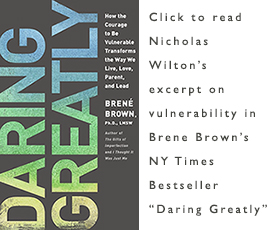 The artist, Nicholas Wilton, with his dog, Maisy.
The artist, Nicholas Wilton, with his dog, Maisy.
You loved how everything was going, you are on top of the world and then suddenly everything changes. You just went too far. If you had just stopped earlier…. Stopping is a very hard thing to do. This always comes up in the ArtLife Workshops. Here are the 5 ways I use to not overwork my Art.
1 WORK LITTLE AND OFTEN
Over the years I have shortened the time of my painting sessions. I used to slave a way all day long but finally realized that I am way more efficient and can maintain objectivity if I limit my time to about 2 hours per piece. This way, I don’t burn out and am more excited to come back to it the next day. Like a great dinner party, or a very small amazing desert, it is always better to leave wishing there was more.
2 HIGH ENERGY
There is high energy when you are starting something new or when the work is going well. Once things start to get too complicated or things are going in an unfavorable direction, there is a corresponding feeling of boredom or low energy. Pay attention so you can then change the particular process you are involved in to one that generates a more positive sensation for you. If suddenly the feelings shift it might mean it is time to stop.
3 MAKE SEVERAL THINGS
The easiest way to remain objective is to work on several things simultaneously. Try switching after an hour or so to something else. The soul loves change and will reawaken when presented with a fresh opportunity to see and consider something new. Working on a second piece often provides helpful information for the first.
4 SLEEP ON IT
If you can go away there will always be a fresh reserve of objectivity and non-attachment upon your return. By the next day, the particular art issue that concerned me is totally irrelevant. Go away for a day and when you come back all will be thankfully different.
5 IS IT WONDERFUL?
If your work seems pretty great to you it is important to stop. Ask yourself “Does this give me a feeling of Wonder?”
Imagine someone walking down the road and they have just noticed your art lying on the ground. Would they stoop down and pick it up? If they would, then stop working.
You want them to stop and preferably, after they make sure no one is looking, put it in their pocket and take it home with them. In that case you will be happy you stopped.
How do you know when to stop? Please leave your comments below.
Inquisitively, Nicholas



